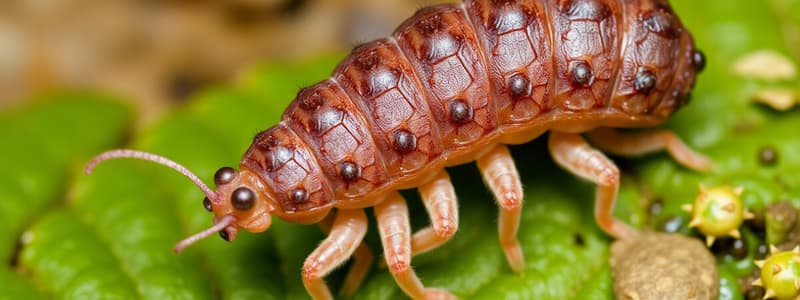Podcast
Questions and Answers
Which of the following organisms are classified into the kingdom Animalia?
Which of the following organisms are classified into the kingdom Animalia?
- Bacteria
- Fungi
- Animals (correct)
- Plants
Fungi are prokaryotic organisms.
Fungi are prokaryotic organisms.
False (B)
Match the following kingdoms with their cell type:
Match the following kingdoms with their cell type:
Monera = Prokaryotic Protista = Eukaryotic Plantae = Eukaryotic Fungi = Eukaryotic Animalia = Eukaryotic
Which of the following is NOT a characteristic of animal cells?
Which of the following is NOT a characteristic of animal cells?
What is the mode of nutrition for most animals?
What is the mode of nutrition for most animals?
What is the mode of nutrition for Fungi?
What is the mode of nutrition for Fungi?
All organisms in the kingdom Animalia are multicellular.
All organisms in the kingdom Animalia are multicellular.
Prokaryotic cells have a true nucleus.
Prokaryotic cells have a true nucleus.
The cell wall is present in all eukaryotic cells.
The cell wall is present in all eukaryotic cells.
What is the term for a group of organisms of the same species living in the same area?
What is the term for a group of organisms of the same species living in the same area?
What is the term for multiple populations interacting together in a specific area?
What is the term for multiple populations interacting together in a specific area?
What is the term for a group of interacting communities and their physical environment?
What is the term for a group of interacting communities and their physical environment?
Flashcards
Population
Population
A group of organisms of the same species that live in a specific area.
Immigration
Immigration
The process of organisms moving into a population.
Emigration
Emigration
The process of organisms leaving a population.
Births
Births
Signup and view all the flashcards
Deaths
Deaths
Signup and view all the flashcards
Capture-recapture method
Capture-recapture method
Signup and view all the flashcards
Prokaryotic cell
Prokaryotic cell
Signup and view all the flashcards
Eukaryotic cell
Eukaryotic cell
Signup and view all the flashcards
Cell wall
Cell wall
Signup and view all the flashcards
Phototrophic
Phototrophic
Signup and view all the flashcards
Heterotrophic
Heterotrophic
Signup and view all the flashcards
Chemoautotrophic
Chemoautotrophic
Signup and view all the flashcards
Mode of nutrition
Mode of nutrition
Signup and view all the flashcards
Monera
Monera
Signup and view all the flashcards
Protista
Protista
Signup and view all the flashcards
Fungi
Fungi
Signup and view all the flashcards
Plantae
Plantae
Signup and view all the flashcards
Animalia
Animalia
Signup and view all the flashcards
Digestion
Digestion
Signup and view all the flashcards
Absorption
Absorption
Signup and view all the flashcards
Study Notes
Classification of Organisms
- Organisms are classified into kingdoms based on their cellular structures
- Kingdoms include Monera, Protista, Fungi, Plantae, and Animalia
- These kingdoms are further categorized by cell type, cell wall presence, and nutritional mode
- Cell type can be prokaryotic (no nucleus) or eukaryotic (nucleus)
- Cell wall presence varies among kingdoms (e.g., present in plants, absent in animals)
- Nutritional modes include phototrophic (using sunlight), heterotrophic (consuming other organisms), or chemoautotrophic (using chemicals)
Population Biology
- A population is a group of the same species in a specific area
- Population size is influenced by births, immigration, deaths, and emigration
- Population size can be estimated using the capture-recapture method (formula in image 5)
- Different levels of biological organization exist, from atoms to ecosystems; image 4 shows this hierarchy
Studying That Suits You
Use AI to generate personalized quizzes and flashcards to suit your learning preferences.




